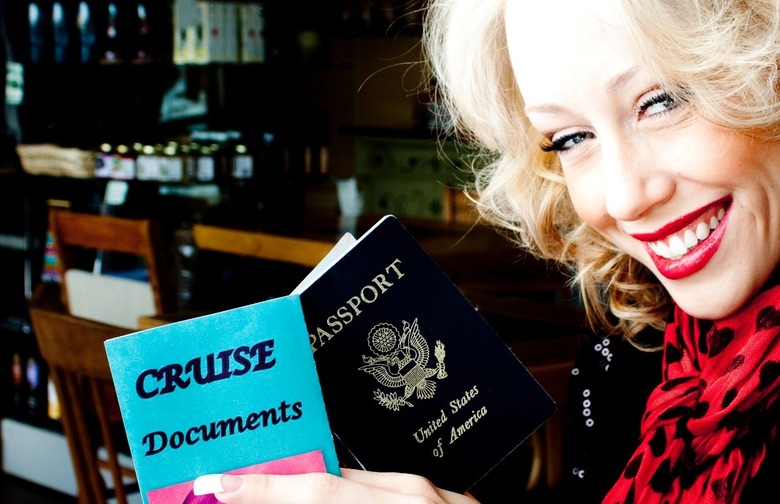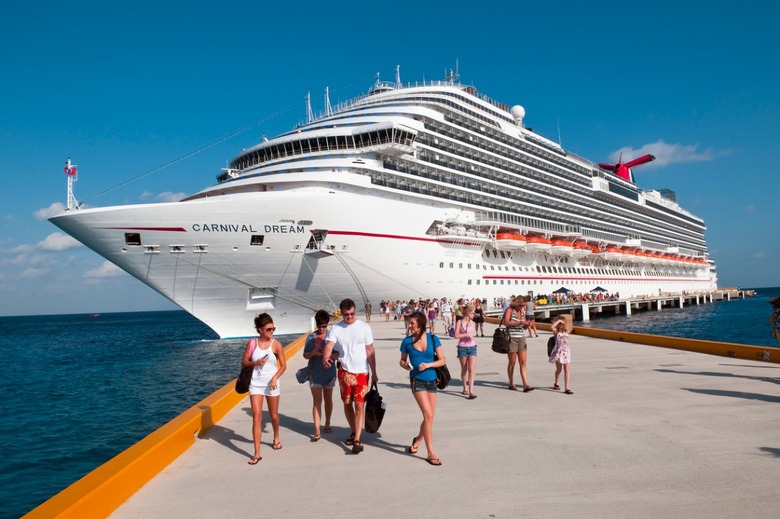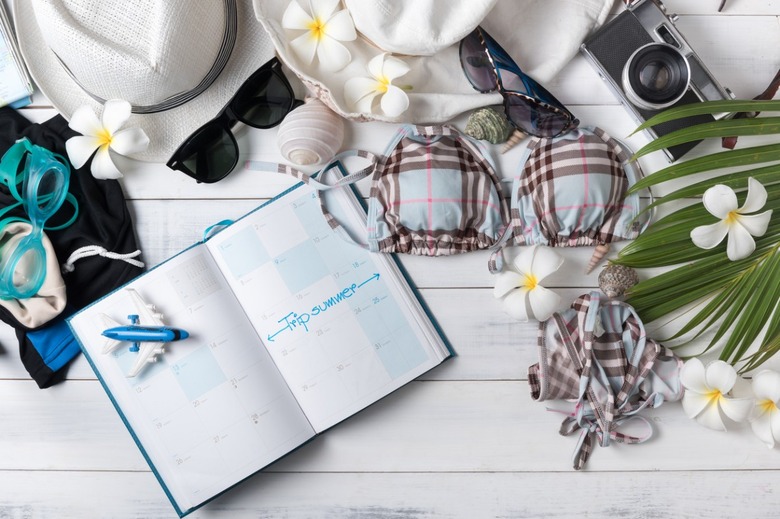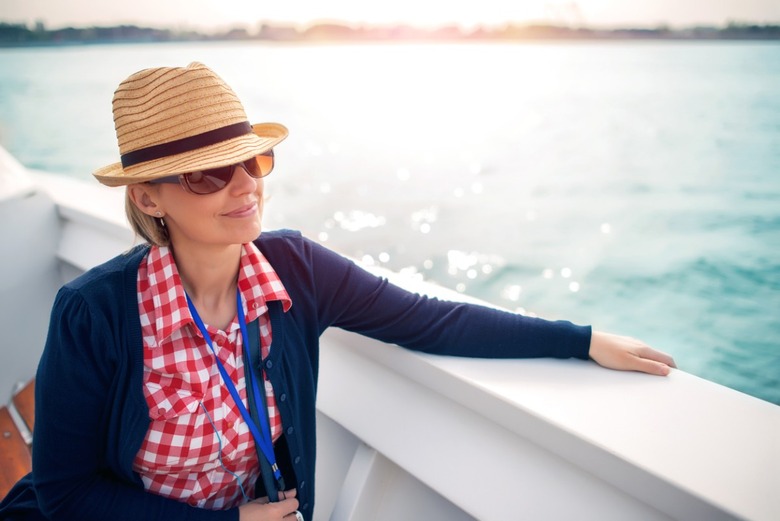20 Cruise Tips For First Timers Gallery
A cruise ship is a vacation like no other; out at sea, you're surrounded by surprisingly affordable luxury, nonstop events and shopping, tons of other happy vacationers, and of course, delicious food in abundance. A popular choice for spring break and summer travelers, cruising is exciting no matter how many times you've done it before. However, there's still nothing like your first time.
Whether you're looking to board a ship meant for the whole family or take advantage of the rare child-free getaway at sea, if you've never been on a cruise before, you're in for a trip like nothing you've ever experienced before. That's why it's important to do your homework and make sure you're prepared so that you can experience all the excitement of a first-time cruiser with none of the anxiety. In order to make sure your vacation has smooth sailing, check out these 20 cruise tips for first time passengers.
Be Prepared for Potential Seasickness
Even if you've never been seasick before, chances are that if this is your first cruise, you could still encounter some nausea, as it's likely to be a longer trip at sea than you've taken in the past. Pack an over-the-counter antihistamine meant for prevention of motion sickness or ask your doctor for a prescription scopolamine patch that you can apply just behind your ear to prevent any seasickness. Drinks such as ginger ale, lemon juice, and peppermint tea are also good for nausea, and luckily you'll have access to plenty on the ship.
Book a Cabin Toward the Middle of the Ship
Another way to protect yourself against seasickness is to book a cabin that's as close to the middle of the ship as possible, as this is the area that feels the least amount of movement while the ship is sailing. Getting a cabin on as low of a deck as you can is also a good idea for the same reason.
Bring Your Passport
Even if you're going on a cruise that doesn't stop at any international ports, it's best you take your passport with you as you likely will be traversing international waters. Either way, make sure your passport is good for at least six months after your departure from your destination. It is also essential to pack copies of all your travel documentation as well.
Budget for Port Fees and Gratuities
Cruises are a great value vacation, and while you do pay amazingly low fares, the bill doesn't stop there. Once you're on the ship, you're likely to be charged taxes and port fees which can cost hundreds depending on your itinerary. Gratuities on the ship can also run about $15 per person per day, and it's common for cruises to cost two to three times the initial price tag when booking. Budget accordingly.
Buy Travel Insurance
All kinds of scary or unfortunate things can happen during a trip. While everything will most likely go smoothly, cruises are a big expense, so it's best to keep yourself covered with travel insurance. In case of sickness, injury, delays, lost baggage, or other mishaps, the insurance will cover any losses or costs incurred.
Check the Alcohol Policy
Alcohol is a big draw on cruises which get quite a bit of their revenue from it, so policies regarding bringing alcohol on board tend to be strict. A majority of cruise lines will allow you to bring at least one bottle of your favorite wine on board, but we advise checking the cruise line's website or calling their customer service line to find out about their alcohol policy and how much the corkage fee is for each bottle of wine or Champagne you bring on board.
Don’t Opt for Early Disembarkation
Also known as self-disembarkation or express departure, cruises often offer the option of early disembarkation for those cruise passengers who are willing and able to carry their own luggage off the ship and through customs. While this sounds like a good and easygoing option, most passengers opt for it, which results in long waits to get off the ship. We suggest you take whatever time you can to enjoy the ship and its breakfast buffet and disembark at the regular time when lines are likely to be shorter.
Don’t Show Up Super Early
On a similar note, don't be in such a rush to get onto the ship either. Unless your cruise line utilizes a staggered check-in, chances are you'll have a boarding window within which you are to check in and get onto the ship. Most ships have over 3,000 passengers, and as everyone is excited to get started on their vacation, there tends to be a big rush in the earlier part of the window. We suggest waiting until there's about an hour left for boarding; check-in will take you just a few minutes, as most people have already gone through customs and boarded the ship.
Fly in as Early as Possible
Cruise ships are pretty strict about their timings for leaving port. Book your flight so that you arrive as early as possible the morning of your embarkation, if not the day before. Flight delays can happen, so it's best you stay on the safe side so that you're there in time to board. For the same reason, we suggest booking your flight home in the late afternoon or evening so that you give yourself enough time after disembarking. You can also book a package with your cruise line that includes your flights so that someone else can worry about the timing for you.
Go for at Least a Week
With all the mind-blowing amenities available on cruise ships these days, you're going to need more than just a few days to explore your vessel if it's your first time. Three to five nights can be great for a quick trip, but a first-time cruiser won't find it nearly long enough to truly appreciate everything a ship has to offer — plus you want the fun to last as long as possible!
Go Off Menu
Cruises are a foodie's dream vacation, yet despite all the focus on great cuisine, many passengers don't seem to realize that the ship is more than willing to accommodate their desires. If you see a dish is no longer available on the dining room menu, ask for it anyway. It's very likely that the kitchen will work to accommodate what you want as long as it's available.
Have Cash on Hand for Tipping
Most gratuities on the ship are included, particularly those for your meals. However, there are still many times when you may need to have a few bucks on hand for some old-fashioned tipping. Porters are often on hand to carry your bags and room service is available around the clock, so it's best to keep some dollar bills on hand so that you can show your appreciation for the individuals on the ship who go out of their way to make your cruise vacation a wonderful experience.
Pack a Light Jacket or Shawl
Most cruises tend to head for sunny shores, but even if you're checking tropical islands off your bucket list, it's a good idea to pack something to help you keep warm. It can get chilly in the evenings, particularly if you're on deck while sailing at night, and there are also spots on board that may be a bit too well air-conditioned for you.
Pay Attention to Dress Code
While it's understandable that you may want to just kick back in your shorts or swimwear while on vacation, cruises are known to specific dress codes for the evening. Check with your cruise line to see which nights are designated formal nights and which restaurants may expect smart casual wear. Formal usually means a dark suit, tuxedo, cocktail dress, or evening gown, and smart casual calls for slacks, jackets, dresses, and pantsuits. Check out your cruise's schedule and what's planned for each night when packing for your trip.
Read up on Your Destination
Whether your ship will be docking in just one city or hitting multiple ports, it's always a good idea to know exactly what you're in for when you get there so that you can plan ahead and make the best of your time in port. Find out if there are any world-famous beaches that you can relax on, which landmarks you might want to visit, and what kind of food you should get a taste of before leaving.
Set Your Watch to Local Time
As previously stated, cruise ships are strict about the time they leave port. Don't depend on your cell phone for telling the time, as you may either want to keep it turned off internationally or it may not switch to local time if you keep it on. Wear a wristwatch and set it accordingly before getting off the ship so that you can keep track of when you need to get back.
Spend on Excursions
Many passengers make the mistake of totally skipping shore excursions because they seem expensive. While many shore excursions that run just a few hours can run upwards of $100, they're actually pretty worth it. Excursions are a great way to explore the destination you're visiting; you can hit up all the must-see landmarks, go on a food tour, or take a trip to a renowned village nearby. While you can book a shore excursion once you're on board, doing so ahead of time is recommended due to promotional discounts and so that spots don't fill up before you get your chance. You can also book with a tour company that specializes in shore excursions for cruise passengers, but an added benefit of going with the cruise line is that they'll make sure not to leave without you in case of a delay.
Take Advantage of the Free Room Service
Even the best all-inclusive resorts in the world don't have free room service — usually the luxury of having someone cater to your needs from the comfort of your room is an added expense. On a cruise, however, it won't cost you anything to order food from your room if you don't want to head down to the buffet. If there are any extra charges, it'll be clearly indicated on the menu, but other than that all you have to worry about is tipping.
Turn Your Phone Off
A cruise is the best place to unplug, but that's not the only reason you should turn off your data. Cell phone data charges can be exorbitant when you're out at sea and outside of the country, and you don't want any surprises once you're back on land, looking at your phone bill. Even if you're not using your phone, it may connect to a roaming tower or use up data with updates or receiving messages. Either turn it off, put it in airplane mode, or update to an international data plan that'll cover your trip.
Use a Travel Agent
Cruising is unlike any other type of vacation, and while your cruise line likely will have great customer service, it's not a bad idea to connect with someone who can help you plan and curate a trip catered to your specific needs. A travel agent can help you book cheap flights, find the right ship and cabin location, and help you get great promotions and perks once you're on board. Most travel agents are experts when it comes to cruises, and helping you plan a great time on your cruise ship is just one of many ways they can save you a headache.
More From The Daily Meal:
The 50 Best All-Inclusive Resorts in the Caribbean
The Best Beach Restaurants in America
25 Crazy Facts About Airplane Food



















